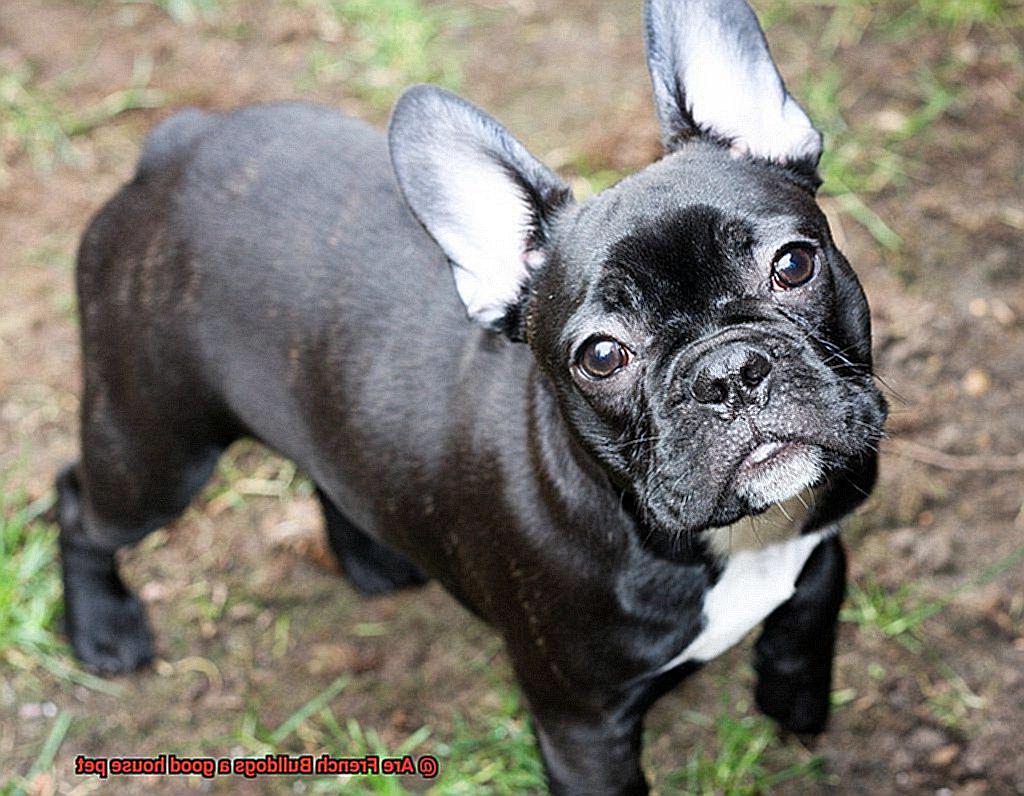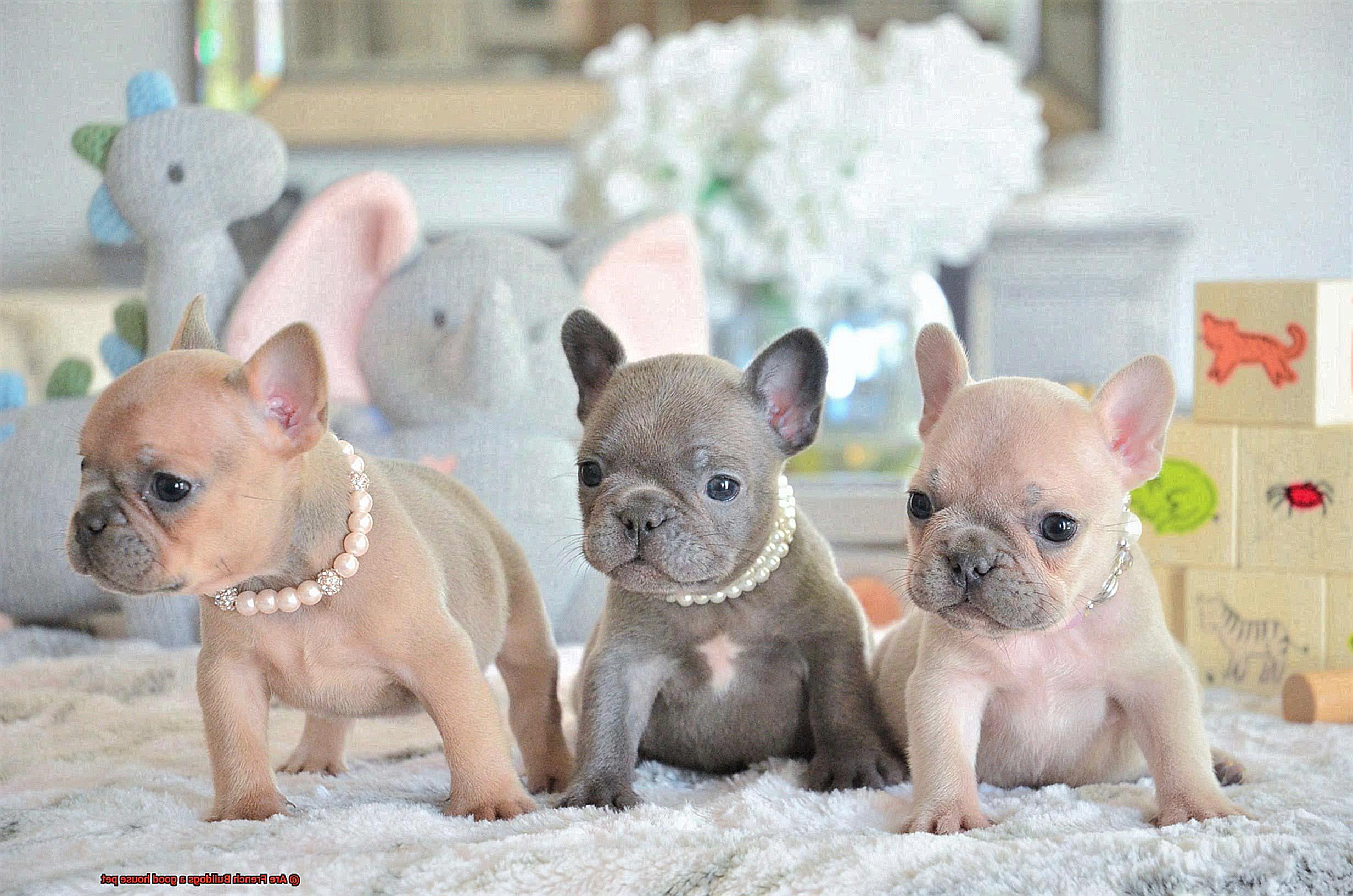Are French Bulldogs a good house pet?
French Bulldogs are undeniably adorable, with their cute bat-like ears and compact bodies.
But are they the perfect fit for your home? In this blog post, we’ll dive into the pros and cons of having a French Bulldog as a house pet.
These little guys are known for being friendly and affectionate, making them fantastic companions. Plus, their small size and low exercise needs make them ideal for apartment living.
However, be prepared for some stubbornness during training sessions. And don’t forget about their health concerns.
So join us as we explore all the nitty-gritty details and help you decide if a French Bulldog is the right furry addition to your household.
Are French Bulldogs a good house pet
Contents
- 1 Are French Bulldogs a good house pet
- 2 Temperament and Characteristics of French Bulldogs
- 3 French Bulldog Energy Levels and Exercise Requirements
- 4 Adaptability of French Bulldogs to Different Living Environments
- 5 Potential Health Issues with French Bulldogs
- 6 Affectionate Nature of French Bulldogs Makes Them Good Companions
- 7 How French Bulldogs Get Along with Other Pets and Children
- 8 Pros and Cons of Having a French Bulldog as a House Pet
- 9 Tips for Caring for Your French Bulldog Properly
- 10 Conclusion

If you’re considering adding a furry companion to your home, you’ve come to the right place. We’ll explore the many reasons why French Bulldogs are pawsitively perfect for your household.
Friendly and Affectionate Nature:
French Bulldogs are known for their loving and friendly personalities. They enjoy being around their human family members and thrive on companionship. Whether you’re relaxing on the couch or going for a leisurely walk, your Frenchie will be right by your side, showering you with love and affection.
Low Exercise Requirements:
If you’re not the most active person or live in an apartment with limited outdoor space, French Bulldogs are the ideal choice. They have low exercise needs and are content with short walks and indoor playtime. This makes them perfect for individuals or families with busy lifestyles or those who prefer a more laid-back pet.
Great with Children:
French Bulldogs are generally good with children and can be very patient and tolerant. They have a gentle nature and enjoy being part of the family. However, it’s important to supervise interactions between young children and dogs to ensure everyone stays safe and happy.
Adaptability to Different Living Situations:

French Bulldogs are adaptable companions who can easily adjust to different living situations. Whether you live in a small apartment or a larger home, they will make themselves comfortable anywhere. They are also not overly sensitive to changes in routine or environment, making them great travel companions.

Easy to Train:
French Bulldogs are intelligent dogs that respond well to positive reinforcement training methods. With consistency, patience, and plenty of treats, you can teach them basic commands and even some fun tricks. Their eagerness to please their owners makes training sessions enjoyable for both of you.
Low Grooming Needs:
Unlike some other breeds, French Bulldogs have short coats that require minimal brushing and do not shed excessively. This means less time spent on grooming and more time for cuddles and playtime with your furry friend. However, regular cleaning of their facial wrinkles is important to prevent infections or skin irritations.
Health Considerations:
While French Bulldogs are generally healthy dogs, they can be prone to certain health issues due to their unique physical features. It’s important to choose a reputable breeder who screens for common health conditions such as hip dysplasia, patellar luxation, and eye problems. Regular veterinary check-ups and a nutritious diet are essential for maintaining their overall health and well-being.
Temperament and Characteristics of French Bulldogs
French Bulldogs, or “Frenchies” as they are affectionately called, are adored for their charming personalities and unique temperament. Whether you’re considering bringing one into your family or already have a French Bulldog, it’s important to understand their temperament and characteristics to ensure a harmonious relationship.
In this article, we’ll dive deeper into the world of French Bulldogs, exploring their friendly and sociable nature, adaptability, playfulness, training challenges, affectionate demeanor, and need for companionship. Let’s get started.
Friendly and Sociable Nature:
- French Bulldogs thrive on human companionship and make great family pets.
- They are known to be tolerant and patient, making them excellent with children.
- Their friendly demeanor makes them a joy to be around, both for their owners and strangers alike.
Playful and Mischievous Personalities:

- Despite their small size, French Bulldogs have big personalities.
- They love entertaining their owners with their playful antics.
- However, they do not require high energy levels and are suitable for apartment living.
Adaptability:
- French Bulldogs are highly adaptable to different living situations.
- Whether you live in a bustling city or a quiet suburb, they can thrive as long as they receive attention and care.
- They are versatile companions who can adjust well to various routines and lifestyles.
Training Challenges:

- French Bulldogs can be stubborn at times, which can pose training challenges.
- Patience, consistency, and positive reinforcement techniques are key to successful training.
- With proper training, Frenchies can become well-behaved companions.
Affectionate Demeanor:
- French Bulldogs are known for their love of being around their owners.
- They crave attention and enjoy cuddling up on laps or snuggling next to their loved ones on the couch.
- Their affectionate nature makes them excellent emotional support animals.
Socialization with Other Animals:
- French Bulldogs generally get along well with other dogs and pets.
- Early socialization is essential to ensure positive relationships.
- Proper introductions and supervised interactions can prevent any territorial issues.
Need for Companionship:
- French Bulldogs can be prone to separation anxiety if left alone for long periods.
- They thrive on human presence and may become distressed when isolated.
- Potential owners should consider their availability and lifestyle before bringing a French Bulldog into their home.
French Bulldog Energy Levels and Exercise Requirements

French Bulldog Energy Levels and Exercise Requirements: Keeping Your Frenchie Happy and Healthy
Are you thinking about bringing a French Bulldog into your home? These adorable little dogs are known for their low energy levels and laid-back personalities, making them a great choice for people who prefer a more relaxed pet. But just because they don’t have the energy of a Border Collie doesn’t mean they don’t need exercise. In fact, regular exercise is essential for keeping your Frenchie happy and healthy.
Let’s dive into the exercise requirements for French Bulldogs and how you can ensure they get the physical activity they need.
Exercise Requirements: How Much is Enough?
French Bulldogs are not high-energy dogs, but they still require daily exercise to prevent weight gain and maintain good overall health. A minimum of 30 minutes of exercise per day is recommended for these lovable pooches. This can be in the form of walks, playtime in the backyard, or interactive games indoors.
It’s important to note that French Bulldogs are brachycephalic breeds, which means they have a shorter muzzle. This can make it difficult for them to breathe and regulate their body temperature, especially in hot weather. To keep your Frenchie safe, avoid excessive exercise in high temperatures and opt for shorter, more frequent bursts of activity.
Activities That Suit French Bulldogs
While French Bulldogs may not have the stamina for long hikes or intense agility courses, there are plenty of activities that suit their energy levels and physical capabilities. Here are some ideas to get you started:
- Walks: Take your Frenchie for leisurely walks around the neighborhood. This not only provides physical exercise but also mental stimulation as they explore their surroundings.
- Indoor Playtime: Set up a play area indoors with toys and interactive games. Toss a ball for them to chase or engage in a game of tug-of-war. This allows them to burn off energy without putting stress on their joints.
- Swimming: If you have access to a pool or a safe body of water, swimming is a fantastic low-impact exercise for French Bulldogs. It helps keep them cool in the summer and provides a full-body workout.
Mental Stimulation: Exercising Their Brains
In addition to physical exercise, French Bulldogs also need mental stimulation to keep their minds sharp. These intelligent dogs thrive on mental challenges, so make sure to incorporate activities that engage their problem-solving abilities. Here are some ideas:
- Training Sessions: Teach your Frenchie new tricks and commands. This not only exercises their brains but also strengthens the bond between you and your furry friend.
- Puzzle Toys: Invest in puzzle toys that require your Frenchie to figure out how to get a treat or toy out of them. This keeps their minds engaged and prevents boredom.
Adaptability of French Bulldogs to Different Living Environments
French Bulldogs, with their charming personalities and unique appearance, have become increasingly popular as house pets. One of the reasons for their popularity is their ability to adapt to different living environments. In this blog post, we will explore how French Bulldogs’ size, energy level, sociability, grooming needs, and temperature adaptability make them the perfect companions for various lifestyles. So, whether you live in a cozy apartment or a spacious house, French Bulldogs are here to bring warmth and joy to your home.
Size: Perfect Fit for Any Space
French Bulldogs are small in size, making them an ideal choice for apartment dwellers or those with limited space. Their compact physique allows them to navigate tight corners and enjoy indoor activities without feeling cramped. Plus, their adorable appearance ensures they fit snugly into any living environment.
Energy Level: The Perfect Balance
French Bulldogs have a moderate energy level that caters to both active and relaxed lifestyles. They enjoy daily walks and playtime but won’t demand excessive exercise. This makes them suitable for individuals who may not have the time or physical capabilities for high-intensity activities. So, whether you’re a busy professional or a retiree looking for a companion, French Bulldogs can adapt to your pace.
Sociability: A Friend to All
French Bulldogs are renowned for their friendly and sociable nature. They thrive on human companionship and make great family pets. Their affectionate temperament and love for children make them a perfect fit for households with kids. Additionally, their ability to get along with other pets makes them a versatile choice for multi-pet households.

Grooming Needs: Low Maintenance, High Style
French Bulldogs have short coats that require minimal grooming. They shed minimally and only need occasional brushing to keep their coat looking neat and healthy. This low maintenance routine is a boon for busy individuals who desire a clean and tidy living environment without spending hours on grooming.
Temperature Adaptability: Handling Climate with Care
While French Bulldogs may not be the best choice for extreme weather conditions, they can adapt well to moderate climates with proper care. Their short snouts make them susceptible to heat exhaustion, so it’s crucial to provide them with shade and access to fresh water in warm weather. Similarly, in colder climates, they may require extra layers or indoor heating to keep cozy.
Potential Health Issues with French Bulldogs
French Bulldogs are adorable and affectionate dogs that make great companions. However, it is important to be aware of the potential health issues associated with this breed. French Bulldogs are prone to certain health conditions due to their unique physical characteristics. In this article, we will discuss some of the common health issues that affect French Bulldogs and provide tips on how to keep your Frenchie happy and healthy.
Brachycephalic Airway Syndrome (BAS):
One of the most common health issues in French Bulldogs is Brachycephalic Airway Syndrome. This syndrome is a result of their flat faces and shortened airways, which can lead to breathing difficulties. French Bulldogs often snort, wheeze, and have trouble regulating their body temperature. To prevent overheating, it is crucial to provide them with a cool and well-ventilated environment, especially during hot weather.
Obesity:
French Bulldogs have a tendency to gain weight easily, which can put additional strain on their joints and exacerbate existing respiratory problems. Monitoring their diet and providing regular exercise is essential to maintain a healthy weight.
Skin Allergies and Dermatitis:
French Bulldogs are prone to skin allergies and dermatitis. Their sensitive skin can be easily irritated by environmental factors such as pollen, dust mites, or certain types of food. Regular grooming and proper hygiene practices are essential in preventing skin issues in this breed.
Genetic Health Conditions:
French Bulldogs are susceptible to various genetic health conditions such as Intervertebral Disc Disease (IVDD), which affects the spinal discs and can lead to pain, weakness, or even paralysis. Regular veterinary check-ups and monitoring of any abnormal symptoms can help detect and manage these genetic conditions early on.
Eye Problems:
Eye problems are prevalent in French Bulldogs, including cherry eye, cataracts, and corneal ulcers. Regular eye examinations by a veterinarian are necessary to identify any potential issues and provide appropriate treatment.
Flatulence:
Lastly, French Bulldogs are known for their flatulence. While it may seem amusing at times, excessive gas can be a sign of digestive issues or dietary intolerance. Maintaining a balanced diet and avoiding foods that may trigger gas can help alleviate this problem.
Conclusion:
Affectionate Nature of French Bulldogs Makes Them Good Companions
Their affectionate nature is one of their most endearing qualities, making them excellent companions for households of all sizes. In this article, we will explore how their loving disposition makes French Bulldogs the perfect addition to any family.
Affectionate Lap Dogs:
French Bulldogs are known for their love of cuddling and snuggling up with their owners. They truly live up to their reputation as “lap dogs.” Whether you’re watching TV, reading a book, or simply relaxing at home, you can always count on your Frenchie to be by your side, showering you with love and affection.
Desire for Human Attention:
These adorable canines have an innate desire for human attention. They thrive on being close to their owners and will follow them around the house, always wanting to be a part of the action. The bond they form with their humans is incredibly strong, creating a sense of loyalty and companionship that is hard to match.
Great with Kids and Other Pets:
French Bulldogs have a gentle and patient demeanor, which makes them excellent companions for families with children. They are known to be great with kids, often becoming their best friends and protectors. Additionally, Frenchies are generally sociable and get along well with other pets in the household, including cats and other dogs.
Therapy Dogs:
Due to their affectionate nature and ability to provide comfort, French Bulldogs make fantastic therapy dogs. Their loving presence can bring joy and emotional support to those in need, whether it’s in hospitals, nursing homes, or schools. Their small size and friendly personalities make them ideal candidates for this role.
Easy to Handle and Live With:

French Bulldogs are not typically aggressive or territorial. They are easy to handle and live with, which makes them suitable for various living situations, including apartment living. Their well-behaved nature indoors makes them compatible with families of all ages and sizes.
How French Bulldogs Get Along with Other Pets and Children
How French Bulldogs Get Along with Other Pets and Children
French Bulldogs are known for their friendly and sociable nature, making them great companions for both humans and animals. Whether you have other pets or children in your household, French Bulldogs can easily adapt and form strong bonds with everyone.
Getting Along with Other Pets
French Bulldogs generally get along well with other dogs and cats if they are properly introduced and socialized from a young age. Early socialization helps them develop positive behaviors and reduces the chances of aggression or territoriality towards other animals. Here are some tips for introducing your French Bulldog to other pets:
- Start Slow: When introducing your French Bulldog to a new pet, start with short and supervised interactions. Allow them to sniff each other and observe their body language closely.
- Positive Reinforcement: Reward your French Bulldog with treats and praise when they display calm and friendly behavior towards the other pet. This helps create positive associations and encourages good behavior.
- Separate Spaces: Initially, it’s a good idea to provide separate spaces for your French Bulldog and the other pet. This allows them to have their own safe spaces while gradually getting used to each other’s presence.
- Supervision is Key: Always supervise their interactions, especially during the initial stages of introduction. This helps prevent any potential conflicts or misunderstandings and ensures the safety of both pets.
Getting Along with Children
French Bulldogs are known for their patient and gentle nature, making them suitable companions for families with children of all ages. However, it’s important to teach children how to properly interact with French Bulldogs to ensure the safety of both the child and the dog. Here are some guidelines:
- Teach Boundaries: Teach children not to pull on the dog’s ears or tail, as this can cause discomfort or agitation. Show them how to gently pet the dog and respect their personal space.
- Supervise Playtime: Young children should always be supervised when playing with any dog to prevent any unintentional harm. Teach them to play gently and avoid roughhousing with the dog.
- Teach Responsibility: Getting a French Bulldog can be a great opportunity to teach children about responsibility. Assign age-appropriate tasks, such as feeding or walking the dog, to help them develop a sense of ownership and care for the pet.
- Positive Reinforcement: Encourage positive interactions between the French Bulldog and the children by praising and rewarding both parties for their gentle behavior. This helps foster a loving and respectful relationship.
Pros and Cons of Having a French Bulldog as a House Pet
French Bulldogs, also known as “Frenchies,” are beloved for their adorable looks and charming personalities. However, owning a French Bulldog comes with both pros and cons. Let’s take a closer look:
Pros:
- Affectionate Companions: French Bulldogs are known for their friendly and affectionate nature. They love to cuddle and make great companions for families and individuals alike.
- Apartment-Friendly: With their small and compact size, French Bulldogs are well-suited for apartment living or homes with limited space. They don’t require a large yard and are generally content with indoor activities.
- Low Maintenance Grooming: Unlike some other breeds, French Bulldogs have a short coat that requires minimal grooming. They don’t shed excessively, making them a good choice for individuals with allergies.
- Moderate Exercise Needs: French Bulldogs are not high-energy dogs, which means they don’t require intense exercise or long walks. They are happy with short daily walks or play sessions, making them suitable for people with a more sedentary lifestyle.
- Good with Children and Other Pets: French Bulldogs are known to be good with children and can be very patient and tolerant. They often form strong bonds with their human family members. Additionally, their docile nature makes them generally non-aggressive towards other animals, making them suitable for homes with existing pets.
- Adaptability and Trainability: French Bulldogs are highly adaptable and can adjust well to different living environments. They are also generally easy to train and can learn basic commands relatively quickly.

Cons:
- Health Issues: One potential drawback of owning a French Bulldog is their tendency to experience health issues. They are prone to certain genetic conditions such as brachycephalic syndrome, which can cause breathing difficulties. Regular vet check-ups and proper care are essential to ensure their well-being.
- Drooling and Snoring: French Bulldogs are notorious for their drooling and snoring. While some people find these traits endearing, others may find them bothersome, especially if they are sensitive to noise or have a preference for a clean house.
- Separation Anxiety: French Bulldogs thrive on companionship and may become distressed if left alone for long periods. They are prone to separation anxiety, so it’s important to ensure they have plenty of mental and physical stimulation and are not left alone for extended periods.
- Housebreaking Challenges: French Bulldogs may be more difficult to housebreak compared to other breeds. Consistent and patient training is necessary to establish proper bathroom habits.
- Short Lifespan: French Bulldogs have a lifespan of around 10-12 years on average, which is shorter compared to some other breeds. This is important to consider when making a long-term commitment to a pet.
Tips for Caring for Your French Bulldog Properly
French Bulldogs, also known as “Frenchie,” are beloved pets known for their friendly nature and unique appearance. Caring for them properly is essential to ensure their health and happiness. From providing a balanced diet to regular exercise, grooming, training, and veterinary care, here are some essential tips for caring for your French Bulldog.
Balanced Diet:
French Bulldogs have a tendency to gain weight easily, so it’s important to provide them with a balanced diet. Feed them high-quality dog food that meets their specific dietary needs. Avoid overfeeding or giving them table scraps, as this can lead to weight gain and other health issues. Monitor portion sizes and consult with your veterinarian about the best diet for your Frenchie.
Regular Exercise:
While French Bulldogs may not require extensive exercise, they still need daily physical activity to maintain a healthy weight and prevent boredom. Take them for daily walks or engage in indoor playtime. However, be cautious of their brachycephalic anatomy, which makes them prone to overheating. Avoid excessive exercise in hot weather and provide plenty of breaks and water during physical activity.
Grooming:
French Bulldogs have short coats that shed moderately, requiring regular brushing to remove loose hair and prevent matting. Clean their facial folds regularly to prevent infection or irritation. Trim their nails and keep their ears clean to prevent potential health issues. Remember that grooming is also an opportunity for bonding with your furry friend.
Training:
Training is crucial for French Bulldogs to ensure they are well-behaved house pets. They can be stubborn at times, so consistency, positive reinforcement, and patience are key when teaching them basic commands and house rules. Establish yourself as the pack leader through consistent training and clear boundaries.
Veterinary Care:
Regular veterinary check-ups are essential for the overall health of your French Bulldog. Vaccinations should be given on schedule, and your vet can address any breed-specific health concerns. Early detection of health issues is crucial, so be proactive in scheduling regular check-ups for your Frenchie.
YmNTJKu_7uw” >
Conclusion
In conclusion, French Bulldogs make excellent house pets. They are known for their affectionate nature and love for human companionship. With their small size and low exercise needs, they are well-suited for apartment living or homes with limited space. Their friendly and sociable demeanor makes them great with children and other pets. Additionally, French Bulldogs have a low tendency to bark excessively, making them suitable for those living in close quarters or noise-sensitive environments.
Moreover, French Bulldogs are easy to groom due to their short coat, requiring minimal maintenance compared to other breeds. Their adaptability and laid-back attitude make them ideal for first-time dog owners or individuals with busy lifestyles.
However, it is important to note that French Bulldogs can be prone to certain health issues such as respiratory problems and obesity. Regular veterinary check-ups and a balanced diet are crucial in ensuring their overall well-being.
All in all, if you’re looking for a loving, adaptable, and low-maintenance companion, a French Bulldog could be the perfect addition to your household.




